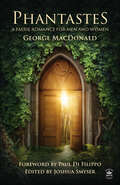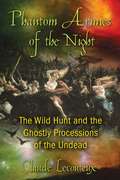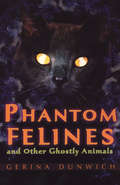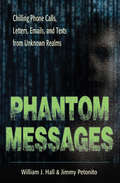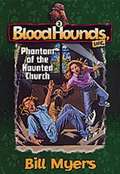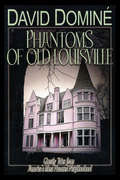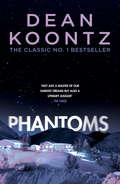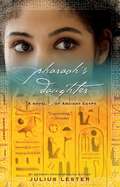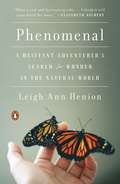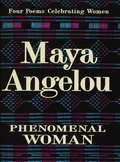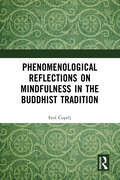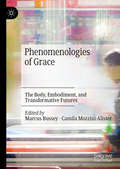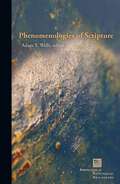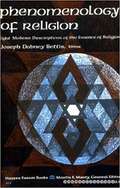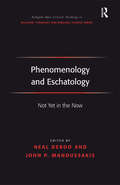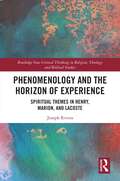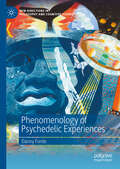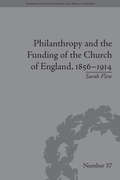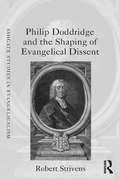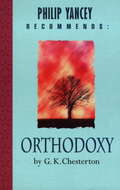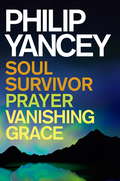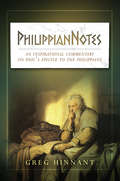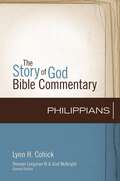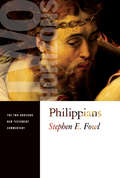- Table View
- List View
Phantastes: A Faerie Romance for Men and Women
by George MacDonald“Whatever the book you are reading now, you simply must get this at once.” —C. S. Lewis Shun the Ash and the Alder… Sing to the Marble Lady… Enter the door of the Timeless… After Anodos is visited by a fairy on his 21st birthday, his bedroom transforms into a forest, leading him to Fairy Land. With the guidance of fairies and knights, he must navigate ethereal and fantastical landscapes, face threats of evil trees and giants, search for a lost love, and conquer his own haunting shadow. One of the earliest works of portal fantasy and an inspiration to the great fantasy authors of the twentieth century! Transport yourself into a tale of love and self-discovery with this fine new edition of Phantastes by George MacDonald, with an additional foreword by author Paul Di Filippo.
Phantom Armies of the Night: The Wild Hunt and the Ghostly Processions of the Undead
by Claude LecouteuxAn exploration of the many forms of the ancient myth of the Wild Hunt and its influence in pagan and early Christian Europe • Recounts the myriad variations of this legend, from the Cursed Huntsman and King Herla to phantom armies and vast processions of sinners and demons • Explains how this belief was an integral part of the pagan worldview and was thus employed by the church to spread Christian doctrine • Reveals how the secret societies of medieval Europe reenacted these ghostly processions for soul travel and prophecies of impending death Once upon a time a phenomenon existed in medieval Europe that continuously fueled local lore: during the long winter nights a strange and unknown troop could be heard passing outside over the land or through the air. Anyone caught by surprise in the open fields or depths of the woods would see a bizarre procession of demons, giants, hounds, ladies of the night, soldiers, and knights, some covered in blood and others carrying their heads beneath their arms. This was the Wild or Infernal Hunt, the host of the damned, the phantom army of the night--a theme that still inspires poets, writers, and painters to this day. Millennia older than Christianity, this pagan belief was employed by the church to spread their doctrine, with the shapeshifters' and giants of the pagan nightly processions becoming sinners led by demons seeking out unwary souls to add to their retinues. Myth or legend, it represents a belief that has deep roots in Europe, particularly Celtic and Scandinavian countries. The first scholar to fully examine this myth in each of its myriad forms, Claude Lecouteux strips away the Christian gloss and shows how the Wild Hunt was an integral part of the pagan worldview and the structure of their societies. Additionally, he looks at how secret societies of medieval Europe reenacted these ghostly processions through cult rituals culminating in masquerades and carnival-like cavalcades often associated with astral doubles, visions of the afterlife, belief in multiple souls, and prophecies of impending death. He reveals how the nearly infinite variations of this myth are a still living, evolving tradition that offers us a window into the world in which our ancestors lived.
Phantom Felines And Other Ghostly Animals
by Gerina DunwichDunwich explores the fascinating phenomenon of animal apparitions, with a special emphasis on cats. Using true tales of animal apparitions from all around the globe, Dunwich reinforces the theory that cats and other animals, like their human counterparts, have spirits that can remain earthbound after death. From cats to dogs to horses, birds and even wild animals, the true tales in this delightful book will give readers a glimpse into a magical world that stretches the boundaries between sight and belief.
Phantom Messages: Chilling Phone Calls, Letters, Emails, and Texts from Unknown Realms
by William J. Hall Jimmy PetonitoHauntings, aliens, and other unexplained phenomena are encountered in strange new ways in this unique investigation into paranormal contact. In Phantom Messages, paranormal investigators William J. Hall and Jimmy Petonito examine stories of unexplained contact by phone, computer, TV, radio, letter, and other mediums. These messages come from a variety of mysterious sources, from loved ones who never sent them to extraterrestrials, deceased friends, and bizarre beings from the past or future. There are recordings of what seem to be future events in progress, and messages from people who lived centuries in the past. Some feature predictions, or warnings, that are eerily accurate. As Hall and Petonito attempt to unravel these impossible communications, they share real life paranormal messages of hope, terror, time slips, and wonder.
Phantom of the Haunted Church (Bloodhounds, Inc. #3)
by Bill MyersSean and Melissa continue their sibling banter even as they are caught up in a dangerous search for a treasure hidden somewhere in the old, supposedly haunted, church that the town is planning to auction.
Phantoms of Old Louisville: Ghostly Tales from America's Most Haunted Neighborhood
by David DominéA paranormal investigator and Old Louisville resident explores chilling reports of hauntings among the historic homes of the National Preservation District.The Louisville, Kentucky, neighborhood known as Old Louisville is one of the country&’s largest National Preservation Districts and the largest Victorian-era neighborhood in the country. Beneath the balconies and terraces of the district's Gothic, Queen Anne, and Beaux Arts mansions, current residents trade stories about the strange and unexplained phenomena they encounter in their historic homes.When David Dominé moved into one of these houses, he dismissed local rumors of a resident poltergeist named Lucy. But soon, disembodied footsteps and mysterious odors changed his mind. Now Dominé is one of Louisville&’s best-known investigators of paranormal phenomena.In Phantoms of Old Louisville, Dominé recounts a horrifying encounter at the Spalding Mansion and the long history of the kindly spirit Avery, who guards the iconic Pink Palace. These tales of things that go bump in the night not only reveal why Old Louisville is considered the "most haunted neighborhood in America," but also help to preserve this historically and architecturally significant community.
Phantoms: A chilling tale of breath-taking suspense
by Dean KoontzFor the survivors, what hope is left? Dean Koontz's Phantoms is a story of disaster and suspense that strikes deep fear throughout its journey to the chilling truth. Perfect for fans of Stephen King and Richard Laymon.'Gruesome and unrelenting' - Stephen KingYesterday Snowfield, California, was a charming little town basking in the golden afternoon sun. Today it is a place of nightmare.An ancient, awesome force has spirited away almost the entire population of the town and left the bodies of those remaining bizarrely disfigured. What hope can there be for the few still left alive...? What readers are saying about Phantoms: 'This is one of the best horror stories I have ever read''A totally immersive story that will draw you in right from the start''As thrilling as it is truly terrifying it kept me enthralled from start to finish'
Pharaoh's Daughter: A Novel of Ancient Egypt
by Julius LesterBorn into slavery, adopted as an infant by a princess, and raised in the palace of mighty Pharaoh, Moses struggles to define himself. And so do the three women who love him: his own embittered mother, forced to give him up by Pharaoh's decree; the Egyptian princess who defies her father and raises Moses as her own child; and his headstrong sister Almah, who discovers a greater kinship with the Egyptian deities than with her own God of the Hebrews. Told by Moses and his sister Almah from alternating points of view, this stunning novel by Newbery Honor-author Julius Lester probes questions of identity, faith, and destiny.
Phenomenal
by Leigh Ann HenionElizabeth Gilbert, author of The Signature of All Things and Eat, Pray, Love "What a cool and fascinating ride. Leigh Ann Henion has tackled one of the great questions of contemporary, intelligent, adventurous women: Is it possible to be a wife and mother and still explore the world? Her answer seems to be that this is not only possible, but essential. This story shows how. I think it will open doors for many." Heartfelt and awe-inspiring, Leigh Ann Henion's Phenomenal is a moving tale of physical grandeur and emotional transformation, a journey around the world that ultimately explores the depths of the human heart. A journalist and young mother, Henion combines her own varied experiences as a parent with a panoramic tour of the world's most extraordinary natural wonders. Phenomenal begins in hardship: with Henion deeply shaken by the birth of her beloved son, shocked at the adversity a young mother faces with a newborn. The lack of sleep, the shrinking social circle, the health difficulties all collide and force Henion to ask hard questions about our accepted wisdom on parenting and the lives of women. Convinced that the greatest key to happiness--both her own and that of her family--lies in periodically venturing into the wider world beyond home, Henion sets out on a global trek to rekindle her sense of wonder. Henion's quest takes her far afield, but it swiftly teaches her that freedom is its own form of parenting--one that ultimately allows her to meet her son on his own terms with a visceral understanding of the awe he experiences every day at the fresh new world. Whether standing on the still-burning volcanoes of Hawai'i or in the fearsome lightning storms of Venezuela, amid the vast animal movements of Tanzania or the elegant butterfly migrations of Mexico, Henion relates a world of sublimity and revelation. Henion's spiritual wanderlust puts her in the path of modern-day shamans, reindeer herders, and astrophysicists. She meets laypeople from all over the world, from all walks of life, going to great lengths to chase migrations, auroras, eclipses, and other phenomena. These seekers trust their instincts, follow their passions, shape their days into the lives they most want to lead. And, somewhere along the way, Leigh Ann Henion becomes one of them. A breathtaking memoir, Phenomenal reveals unforgettable truths about motherhood, spirituality, and the beauty of nature.Oprah.com"Part travel memoir, part parenting manifesto and part inquiry into those 'fleeting, extraordinary glimpses of something that left us groping for rational explanations in the quicksand of all-encompassing wonder.'"From the Hardcover edition.
Phenomenal Woman: Four Poems Celebrating Women
by Maya AngelouA collection of beloved poems about women from the iconic Maya AngelouThese four poems, &“Phenomenal Woman,&” &“Still I Rise,&” &“Weekend Glory,&” and &“Our Grandmothers,&” are among the most remembered and acclaimed of Maya Angelou's poems. They celebrate women with a majesty that has inspired and touched the hearts of millions.&“Phenomenal Woman&” is a phenomenal poem that speaks to us of where we are as women at the dawn of a new century. In a clear voice, Maya Angelou vividly reminds us of our towering strength and beauty.
Phenomenological Reflections on Mindfulness in the Buddhist Tradition
by Erol ČopeljThis book offers an original phenomenological description of mindfulness and related phenomena, such as concentration (samādhi) and the practice of insight (vipassanā). It demonstrates that phenomenological method has the power to reanimate ancient Buddhist texts, giving new life to the phenomena at which those texts point. Beginning with descriptions of how mindfulness is encountered in everyday, pre-philosophical life, the book moves on to an analysis of how the Pali Nikāyas of Theravada Buddhism define mindfulness and the practice of cultivating it. It then offers a critique of the contemporary attempts to explain mindfulness as a kind of attention. The author argues that mindfulness is not attention, nor can it be understood as a mere modification of the attentive process. Rather, becoming mindful involves a radical shift in perspective. According to the author’s account, being mindful is the feeling of being tuned-in to the open horizon, which is contrasted with Edmund Husserl’s transcendental horizon. The book also elucidates the difference between the practice of cultivating mindfulness with the practice of the phenomenological epoché, which reveals new possibilities for the practice of phenomenology itself. Phenomenological Reflections on Mindfulness in the Buddhist Tradition will appeal to scholars and advanced students interested in phenomenology, Buddhist philosophy, and comparative philosophy.
Phenomenologies of Grace: The Body, Embodiment, and Transformative Futures
by Marcus Bussey Camila Mozzini-AlisterThis book explores the place of the body and embodied practices in the production and experience of grace in order to generate transformative futures. The authors offer a range of phenomenologies in order to move the philosophical anchoring of phenomenology from an abstracted European tradition into more open and complex experiential sets of understandings. Grace is a sticky word with many layers to it, and the authors explore this complexity through a range of traditions, practices, and autobiographical accounts. The goal is to open a grace-space for reflection and action that is both futures-oriented and enlivening.
Phenomenologies of Scripture (Perspectives in Continental Philosophy)
by Adam Y. WellsPhenomenologies of Scripture addresses two increasingly convergent disciplines: philosophy and biblical studies. On the one hand, the recent “theological turn” in phenomenology has established religion as a legitimate area of phenomenological inquiry. If that turn is to be enduringly successful, phenomenology must pay attention to the scriptures on which religious life, practice, and thought are based. On the other hand, biblical studies finds itself in a methodological morass. Contemporary approaches to scripture have raised important questions about the meaning and function of scriptural texts that phenomenology is uniquely positioned to answer: How is the meaning of a text constructed or gleaned? How can the divine be present in human words? Is a scientific approach to the Bible still possible? Bringing together essays by eight of today’s most prominent philosophers of religion with responses by two leading biblical scholars, Phenomenologies of Scripture reestablishes the possibility of fruitful, dialectical exchange between fields that demand to be read together.
Phenomenology Of Religion: Eight Modern Descriptions Of The Essence Of Religion (Forum Books Series)
by Joseph D. BettisPhenomenology of Religion: Eight Modern Descriptions of the Essence of Religion
Phenomenology and Eschatology: Not Yet in the Now (Routledge New Critical Thinking in Religion, Theology and Biblical Studies)
by John Panteleimon ManoussakisThis book brings together a world-renowned collection of philosophers and theologians to explore the ways in which the resurgence of eschatological thought in contemporary theology and the continued relevance of phenomenology in philosophy can illuminate each other. Through a series of phenomenological analyses of key eschatological concepts and detailed readings in some of the key figures of both disciplines, this text reveals that phenomenology and eschatology cannot be fully understood without each other: without eschatology, phenomenology would not have developed the ethical and futural aspects that characterize it today; without phenomenology, eschatology would remain relegated to the sidelines of serious theological discourse. Along the way, such diverse themes as time, death, parousia, and the call are re-examined and redefined. Containing new contributions from Jean-Yves Lacoste, Claude Romano, Richard Kearney, Kevin Hart and others, this book is necessary reading for anyone interested in the intersection of contemporary philosophy and theology.
Phenomenology and the Horizon of Experience: Spiritual Themes in Henry, Marion, and Lacoste (Routledge New Critical Thinking in Religion, Theology and Biblical Studies)
by Joseph RiveraThis book explores the threshold between phenomenology and lived religion in dialogue with three French luminaries: Michel Henry, Jean-Luc Marion and Jean-Yves Lacoste. Through close reading and critical analysis each chapter touches on how a liturgical and ritual setting or a spiritual vision of the body can shape and ultimately structure the experience of an individual’s surrounding world. The volume advances debate about the scope and limits of the phenomenological analysis of religious themes and disturbs the assumption that theology and phenomenology are incapable of constructive interdisciplinary dialogue.
Phenomenology of Psychedelic Experiences (New Directions in Philosophy and Cognitive Science)
by Danny FordeThis book provides a phenomenological examination of the psychedelic experience. Danny Forde begins by introducing and outlining both the subject matter (psychedelics) and the approach (phenomenology). In the phenomenological analysis, Forde defends a bundle of four interconnected claims. The first thesis is that a minimal sense of self is maintained even during the most turbulent experiences of ego-dissolution. This leads into the second thesis, which argues that rather than being purely hallucinatory, the psychedelic experience can reveal aspects of reality which would not otherwise be disclosed, i.e., as the ego dissolves one gains a view of the world which Forde calls ego-free seeing. The third thesis is that the psychedelic experience can open the subject to the essential nature of reality. Here, Forde claims that the mythopoetic archetypical phenomena encountered during the peak of the psychedelic experience are best comprehended in terms of essences. Finally, Forde argues that the psychedelic experience is a bona fide transformative experience and offers a distinct way of apprehending the Ground of Being.
Philanthropy and the Funding of the Church of England, 1856–1914 (Perspectives in Economic and Social History #37)
by Sarah FlewThe changing relationship between the church and its supporters is key to understanding changing religious and social attitudes in Victorian Britain. Using the records of the Anglican Church’s home-missionary organizations, Flew charts the decline in Christian philanthropy and its connection to the growing secularization of society.
Philip Doddridge and the Shaping of Evangelical Dissent (Routledge Studies in Evangelicalism)
by Robert StrivensEvangelical Dissent in the early eighteenth century had to address a variety of intellectual challenges. How reliable was the Bible? Was traditional Christian teaching about God, humanity, sin and salvation true? What was the role of reason in the Christian faith? Philip Doddridge (1702-51) pastored a sizeable evangelical congregation in Northampton, England, and ran a training academy for Dissenters which prepared men for pastoral ministry. Philip Doddridge and the Shaping of Evangelical Dissent examines his theology and philosophy in the context of these and other issues of his day and explores the leadership that he provided in evangelical Dissent in the first half of the eighteenth century. Offering a fresh look at Doddridge’s thought, the book provides a criticial examination of the accepted view that Doddridge was influenced in his thinking primarily by Richard Baxter and John Locke. Exploring the influence of other streams of thought, from John Owen and other Puritan writers to Samuel Clarke and Isaac Watts, as well as interaction with contemporaries in Dissent, the book shows Doddridge to be a leader in, and shaper of, an evangelical Dissent which was essentially Calvinistic in its theology, adapted to the contours and culture of its times.
Philip Yancey Recommends: Orthodoxy
by G K Chesterton'Why anyone would pick up a book with that formidable title eludes me,' writes Philip Yancey of G. K. Chesterton's Orthodoxy. 'But one day I did so and my faith has never recovered. I was experiencing a time of spiritual dryness in which everything seemed stale, warmed over, lifeless. Orthodoxy brought freshness and, above all, a new spirit of adventure.''We direly need another Chesterton today, I think. In a time when culture and faith have drifted even further apart, we could use his brilliance, his entertaining style, and above all his generous and joyful spirit. He managed to propound the Christian faith with as much wit, good humour and sheer intellectual force as anyone in this century.'Since its first publication in 1908, this classic work has represented a pivotal step in the adoption of a credible faith by many other Christian thinkers, including C. S. Lewis. Written as a spiritual autobiography, it stands as a remarkable and inspirational apologetic for Christianity.
Philip Yancey Recommends: Orthodoxy
by G K Chesterton'Why anyone would pick up a book with that formidable title eludes me,' writes Philip Yancey of G. K. Chesterton's Orthodoxy. 'But one day I did so and my faith has never recovered. I was experiencing a time of spiritual dryness in which everything seemed stale, warmed over, lifeless. Orthodoxy brought freshness and, above all, a new spirit of adventure.''We direly need another Chesterton today, I think. In a time when culture and faith have drifted even further apart, we could use his brilliance, his entertaining style, and above all his generous and joyful spirit. He managed to propound the Christian faith with as much wit, good humour and sheer intellectual force as anyone in this century.'Since its first publication in 1908, this classic work has represented a pivotal step in the adoption of a credible faith by many other Christian thinkers, including C. S. Lewis. Written as a spiritual autobiography, it stands as a remarkable and inspirational apologetic for Christianity.
Philip Yancey: Soul Survivor, Prayer, Vanishing Grace
by Philip YanceyYancey's lifelong writing career has always focused on the search for honest faith that makes a visible difference for a world in pain. In his landmark book What's So Amazing about Grace? he issued a benchmark call for Christians to be as grace-filled in their behaviour as they are in asserting their beliefs.This collection sets out Yancey's search for a life enhanced by faith instead of diminished by religion. Having struggled to forge personal convictions about God amid the ironies of life and the incongruities of religion, he looks closer at those whose lives radiate spiritual authenticity rather than pious posturing.From Dostoevsky to Martin Luther King, G. K. Chesterton to Paul Brand, Yancey pays homage to some of the most remarkable, selfless, Christ-like lives our world has known, and asks what both he and we can do to find such beautiful faith in our own lives. Multi-award winning spirituality writer Philip Yancey is loved throughout the world for his honest, insightful and inspirational writing.
PhilippianNotes: A Commentary on Paul's Epistle to the Philippians
by Greg HinnantGreg Hinnant, one of Creation House&’s most prolific authors, presents an intimate exposition of the Book of Philippians, thoroughly exploring its author, audience, and historical context. PhilippianNotes strikes the right balance, offering content that is both theologically precise and emotionally stirring, making this commentary a valuable resource for pastors and teachers and a very understandable and motivational study for every believer. As with all his books, Hinnant&’s teaching tone is respectful, personal, and pastoral. He has approached this epistle with devotion and scholarship, interweaving his personal insights with the collective wisdom of a host of Christian writers, scholars, and theologians. Numerous biblical references and thought-provoking footnotes are provided for those desiring further study. PhilippianNotes is a uniquely insightful, informative, and moving tapestry of transformational truth and wisdom. It will deepen your appreciation for the apostle Paul, his teachings, and all that God accomplished in and through him—and desires to do in and through us.
Philippians (The Story of God Bible Commentary)
by Tremper Longman III Scot Mcknight Lynn H. CohickEmphasizing the historical distance between the New Testament and contemporary culture, Philippians—part of the new, highly-anticipated Fidei Commentary series on the New Testament—provides pastors, students, Sunday School teachers, and lay people a clear and compelling exposition of the text in the context of the Bible’s overarching story. The authors move away from “application” language, which has been criticized as being too simplistic, instead encouraging discussion of how the Bible’s story can be lived today. Offering a new type of application commentary for today’s context, the Fidei series explains and illuminates Scripture as God’s Story, with each New Testament text examined as embedded in its canonical and historical setting, in order to foster discernment in living the story faithfully and creatively with and for the Church in the 21st Century
Philippians (The Two Horizons New Testament Commentary)
by Stephen E. FowlIn this fine new commentary on Paul's letter to the Philippians, Stephen Fowl notes that for the great premodern commentators of the Christian tradition, the literal sense of Scripture is always regulated by theological concerns. Thus, unlike commentaries that simply append theology to historical criticism, Fowl's volume displays disciplined attention to the text of Philippians in ways that enhance rather than frustrate theological inquiry. While Fowl engages the great scholars of the past, John Chrysostom and Thomas Aquinas among them, he also draws a novel theology of friendship from Paul's letter and unpacks how the teachings of Philippians might be embodied today by Christians in the West.
